Millennium Challenge Corporation VP Cynthia Huger: “Georgia has been stellar for MCC’s programme for education”

MCC VP Cynthia Huger (third from left) photographed with Georgian students involved in robotics projects. Photo: Misha Tchitchinadze.

This summer Georgia’s capital Tbilisi hosted the 2018 Women in Science Camp, which aimed to offer opportunities for young women to build skills in science, technology, engineering, arts and math (STEAM).
The WiSci Camp was held in partnership between the Millennium Challenge Corporation, the United States Department of State, the United Nations Foundation’s Girl Up campaign, as well as Google, Microsoft and Intel as private partners.
To discuss the corporation’s current and previous Georgia Compact programmes and the young women’s camp, Agenda.ge sat down with the MCC's Vice President and Chief Financial Officer Cynthia Huger, on her first international visit since assuming the position.
The interview with Ms. Huger took place following a presentation by a group of young students from Georgia who demonstrated their project on robotics to the high-profile visitor in Tbilisi.
 The young scientists demonstrate their work on a digitally controlled robot for scientific work in Tbilisi. Photo: Misha Tchitchinadze.
The young scientists demonstrate their work on a digitally controlled robot for scientific work in Tbilisi. Photo: Misha Tchitchinadze.
Agenda.ge: We know this is your first international visit since your appointment as the Vice President of the Millennium Challenge Corporation. How impressive was it to have this presentation on your first visit?
MCC VP Cynthia Huger: I think there is no match! Absolutely no match for what I have seen. The Millennium Challenge Corporation has been in partnership with the Girl Up campaign of the United Nations Foundation as well as the Department of State. Then they have also had private partners here — Google, Intel, Microsoft, The American Society for Microbiology — a number of private companies that have stepped in and said “this is something that we would really like to pursue” and you could just see the benefits of it.
Agenda.ge has previously done news stories on the MCC’s Compact programmes — now we are glad to be able to talk to you about them during your visit here. Could you tell us about the purpose of your business trip to Georgia?
The Compact here in Georgia is just a real role model for all of our other Compacts. We have put in 140 million USD to do a number of things, but it all has to do with education. And that really follows the Prime Minister’s goal of making education the priority for Georgia. We have done a lot of that — training teachers, training principals, training young women through the WiSci camp. There have been over 100 girls in the camp. They have been there for two weeks — I think this is Day 12, the last day. We have just seen some of the benefits of what they have been able to do.
While here, we have also talked with other people about rehabilitating schools. Yesterday I was in the Railway College and saw an incredible renovation of the school. And I have been in schools like that before. This was really perfect job. It is also going to encourage people — young people — to start signing up, learning better skills and staying with those skills so that it offers Georgia a better opportunity across the board.
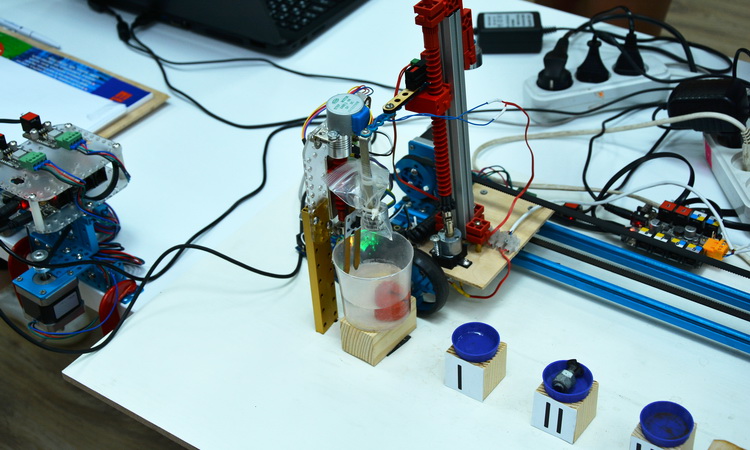 The demonstration involved a showcase of the robot’s ability to distribute chemical solutions and measure their properties. Photo: Misha Tchitchinadze.
The demonstration involved a showcase of the robot’s ability to distribute chemical solutions and measure their properties. Photo: Misha Tchitchinadze.
You have mentioned some of the points on your agenda for the visit — during it you have already had a meeting with the Prime Minister.
The meeting with the Prime Minister was the first one [of the visit] and it set the tone for our meetings in Georgia. He talked about his priority for education in the country, and I think we’re following and encouraging that kind of support in what we are doing here — rehabilitation of schools, which we are going to see more of. You can already see a real difference. These are very modern schools providing the tools and equipment and capability. And those opportunities are new and they are accessible now, rather than before they were not so accessible.
Moving to the subject of the WiSci camp, which launched on August 12 and will conclude tomorrow in Tbilisi. It focuses on empowering women in their education, work and aspirations but what would you name as some of the most crucial aspects of the camp?
Key is to see the changes in women’s minds. They have certain dreams, and those dreams are coming to reality. They are experiencing that they are going beyond that. Maybe they came in and said “I would love to be in chemistry”, or “I would like to be in civil engineering”, or “I would like to be in coding”, or “I would like to do applications”, or “I would like to do something different”.
This is opening up young women’s minds — that is going to have an impact on the entire country of Georgia. It is not going to only increase household incomes with their capabilities, but it is going to reflect on the next generation, their children, how they become involved in better nutrition, better health... so all across the board, it is reaching way beyond their dreams I think.
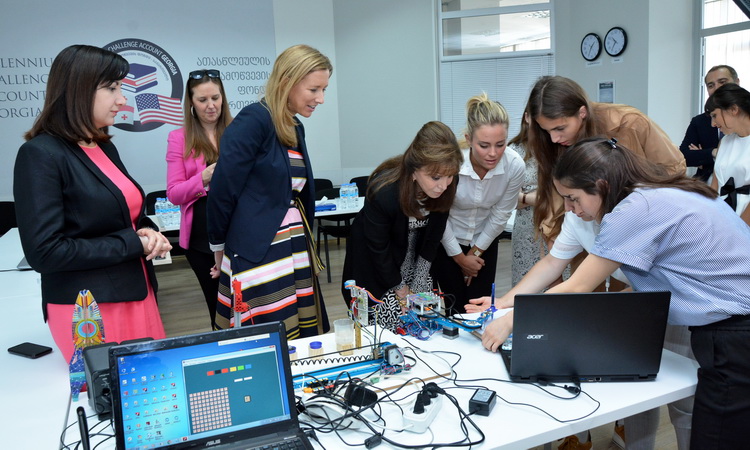 The young creators demonstrate the work of their robotics creation. Photo: Misha Tchitchinadze.
The young creators demonstrate the work of their robotics creation. Photo: Misha Tchitchinadze.
The camp was designed to encompass skills in science, technology, engineering, arts and math. Are these the fields pinpointed as ones where there is particular need for empowering women and creating opportunities for them?
Oh, I think very much so. What I have learned is, in the past, this has not been accessible, but it has also not been talked about. It has been something that the girls have to reach out beyond where they have been, to understand that they can do other things that are beyond the basics at school.
They can go well beyond, so they are now looking at science, technology, engineering, math and arts in this programme, but I think also, they get to talk back and forth with their counterparts. It is not only Georgians — they have been able to reach out to their colleagues in Armenia and Azerbaijan to really have a grasp of cross-cultures.
That ties in well with our next question — the camp has involved girls from Georgia, Armenia, Azerbaijan and the US. Are you pleased with the role of a regional hub Georgia has taken recently for educational and cultural projects and programmes?
I think they are the pinnacle of what is going on here in the Caucasus. I know this WiSci camp in the Caucasus will be talked about in a big way among the girls, among their friends. They are seeing the kinds of things that are going on here, the kind of projects that they have been able to build. They went to NASA and had some experiences there that they will never forget — but they get to bring it back and share it with their classmates, and maybe their classmates will do other things as well.
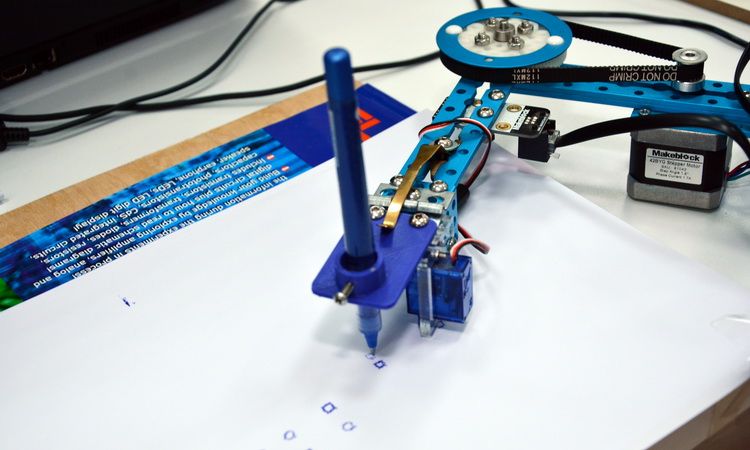 A close-up view of a controller arm of the robot showcased by the group. Photo: Misha Tchitchinadze.
A close-up view of a controller arm of the robot showcased by the group. Photo: Misha Tchitchinadze.
The MCC’s efforts on improving the STEM education quality in Georgia are channelled through the Georgia Compact programmes. What are your thoughts about the results of the first Compact programme, which ran from 2005 and included infrastructural, agricultural and tourism projects?
Agriculture here is pretty big, and also improving roads and the kind of things that we did in the first Compact are really a testament to what the Georgians can do and that the MCC can do together with them. That 395 million USD Compact was a very big partnership and we have done, I think, very well. That is why there is a second Compact, reaching beyond agriculture and roads and saying “Okay, what about the education? How can we combine that with transportation and agriculture and really see Georgia flourish?”
What are some of the notable points that could be outlined about how the Georgia Compact II programme has progressed as it is being implemented?
I think you are going to see a progression from these young women, that are getting the training that they really are excited about. It is going to make an impression for a long time. Also see the principals and teachers being trained — and they are going to keep going.
I think the entire point is what we have done with the San Diego State University and three different partnerships with various universities. You can kind of see the tools, the equipment, the kinds of things that are now going to be available to students.
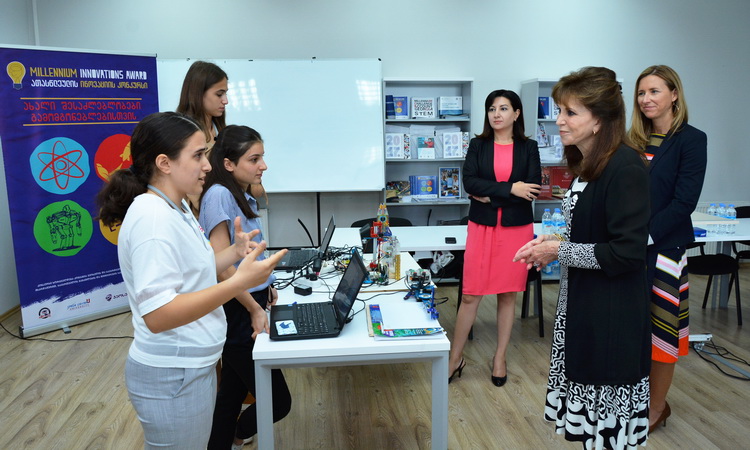 The group of students detail their experiences while working on the project and in science. Photo: Misha Tchitchinadze.
The group of students detail their experiences while working on the project and in science. Photo: Misha Tchitchinadze.
The current Compact shows a focus on women’s economic empowerment for the MCC and the US government. Could you talk about what the results of this work show about why projects like this one are important?
Well, we have seen it today! The young girls are building robots! We have also seen students that have gone on to excel with the San Diego State University in Georgia — some have gone abroad with their schooling, but they come back to Georgia, because they are training here. And that means a lot — to be back home with their family, with their parents, with their colleagues so they can learn and better themselves here at home.
You have worked with governments around the world during your career in positions at state agencies and organisations including the US Department of State, the USAID and of course the MCC currently. You have described Georgia as being among the best partners of the MCC. How much has the Georgian government’s support and cooperation helped your programmes?
I do not think we could do without their support. We need to work together, and it is a partnership that is solidified, is something that is very important as we go forward. Their support and their leadership with that we are doing together makes a real difference.
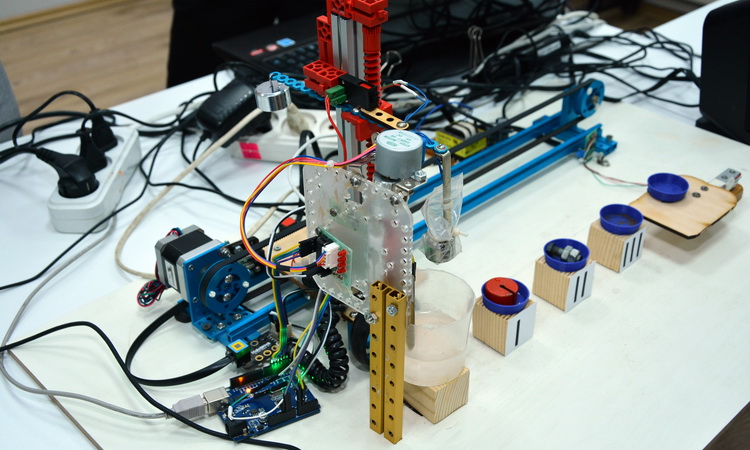 Created by the three students, the robotics project showcased new opportunities for emerging talent as a result of the MCC’s Compact II program in Georgia. Photo: Misha Tchitchinadze.
Created by the three students, the robotics project showcased new opportunities for emerging talent as a result of the MCC’s Compact II program in Georgia. Photo: Misha Tchitchinadze.
Georgia is one of only four countries where the Compact programme is implemented. Does this show the country’s prospects for improving its educational, infrastructural and other opportunities?
I am going to hit on a couple of things. One, infrastructure: what we saw recently in the schools, with them being rebuilt, having the tools, having the labs that are state of the art, cutting edge capability for their students — that really makes a big difference. I have heard stories from students saying “we could not do this at home, or at schools — we could watch but with no hands-on”. That makes a real difference.
I would like to also recommend and talk about someone who has been a real leader here in Georgia — Magda Maghradze, who is the head of the Millennium Challenge Account-Georgia, has been everywhere, every place that she could be to make sure that we are progressing, are doing things together. That, together with the MCC and leadership of Country Director Jenner Edelman, has seen a real symbiotic partnership that is very meaningful, and I know that it is going to continue to grow.
Former Prime Minister Giorgi Kvirikashvili described the MCC’s contributions as a "direct investment in Georgia’s future”. Do you agree with this assessment?
I couldn't agree more! I have seen it first-hand. This is my first Compact and I will not forget Georgia and what I have seen here, because I think it is really one of the best, unmatched among ones I have read about.
To see first-hand the things that are happening here, to see the smiles on people’s faces and dreams that are coming true, is unmatched. For me, Georgia has been a real stellar programme for the MCC.
 Tweet
Tweet  Share
Share